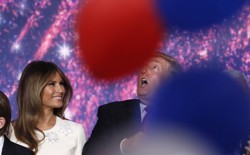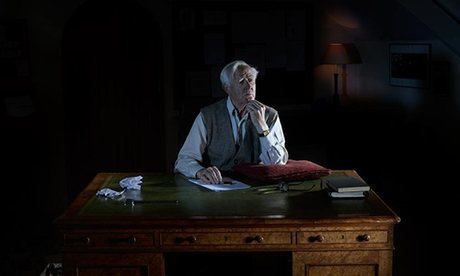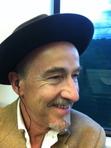Dermott Hayes's Blog: Postcard from a Pigeon, page 46
September 5, 2016
The Eaten Cake
Jim’s shadow was outraged. His master ordered and then had delivered, a cake they both liked but then refused to share. He vowed revenge and, his back turned, the shadow engineered to frame his master for fraud. Led away, arrested, he saw, the cake had been eaten by his shadow.


Political Journalism: Paradox?
Lessons gleaned from 30 years of covering American politics—from Bill Clinton to Donald Trump

A reporter raises his hand during a White House press briefing. Carlos Barria / R
Ron Fournier
Sep 2, 2016
Subscribe to The Atlantic’s Politics & Policy Daily, a roundup of ideas and events in American politics.
I left political journalism once before—to help launch a social media site designed to engage political influencers in civil conversation. It failed (one critic called it “the idiotic Hotsoup.com”), but among the many lessons I took away from the experience was one about journalism.
In a meeting just before the site launched, my business partners—six of the smartest, most successful political consultants in Washington—debated which reporter would be given an interview announcing our venture.
Latest from Politics

Can Melania Trump Win Her Libel Lawsuit?
I mentioned a particular journalist known to be an easy mark inside the White Houses of Bill Clinton and George W. Bush. Afraid of confrontation, eager to please, and lazy, this reporter printed whatever minor bits of news and color aides fed him, without skepticism or criticism. I didn’t respect the guy. Nor did most other reporters forced to compete against a patsy who benefited from a policy of mutual-assured promotion.
“He’ll gobble up what we feed him,” I told my partners.
One groaned. Another winced and said, “Yes, but nobody will buy it. Nobody respects him. They’ll know it’s just a press release.”
Until that moment, I assumed the people we covered in politics valued pushover journalists. I thought this particular reporter got ahead by going along. That might be true on the small stories, but not for the stuff that matters.
One of my partners asked about a Washington Post political correspondent known for his tough, insightful coverage. “You think Dan Balz would buy this?”
“I don’t know,” said another. “But if Balz loves Hotsoup, we’re golden. If he hates it, we’re toast.”
Balz never did write about the project, and we were toast. But I left the meeting knowing that if I ever returned to journalism, I didn’t want to be taken for granted liked the first reporter. I wanted to inspire in my sources what Balz had earned from my partners—respect and fear.


Loss of Soul
By Steven Pearlstein September 2
Steven Pearlstein is a Post business and economics writer. He is also Robinson Professor of Public Affairs at George Mason University.

Daniel Fishel for The Washington Post
When I assigned an 800-page biography of Andrew Carnegie for a new undergraduate course on wealth and poverty at George Mason University a few years ago, I wasn’t sure the students would actually read it. Not only did most of them make it to the end, however, but many thanked me for giving them the chance to read a popular work of history. Curious, I inquired how many were history majors. Of the 24 honors students in the seminar, there were none. English? Philosophy? Fine arts? Only one. How was this possible? I asked. Almost in unison, half a dozen replied: “Our parents wouldn’t let us.”The results were similar when I surveyed freshmen in another honors seminar this spring. This time, I asked how many would have been humanities majors if the only criteria were what they were interested in and what they were good at. Ten of the 24 raised their hands.


September 4, 2016
VIVA THE BOOK
By DANIEL VICTORSEPT. 2, 2016
Continue reading the main story
Photo

Books line the walls on at Common Grounds, in DeKalb, Ill., in August. Credit Katie Smith/Daily Chronicle, via Associated Press
Even with Facebook, Netflix and other digital distractions increasingly vying for time, Americans’ appetite for reading books — the ones you actually hold in your hands — has not slowed in recent years, according to a study by the Pew Research Center.
Sixty-five percent of adults in the United States said they had read a printed book in the past year, the same percentage that said so in 2012. When you add in ebooks and audiobooks, the number that said they had read a book in printed or electronic format in the past 12 months rose to 73 percent, compared with 74 percent in 2012.
Twenty-eight percent said they had opted for an ebook in the past year, while 14 percent said they had listened to an audiobook.
Lee Rainie, the director of internet, science and technology research for Pew Research, said the study demonstrated the staying power of physical books.


One more Flax Golden Tale
Sep 3, 2016
Once I spoke your language. Every glance. Your every expression. The subtle meaning behind each word uttered. Your questions — crying for each falling snowflake.
“Is it dying?”
Now you prefer palm trees and sandy beaches. Tropical flowers.
I told you to imagine what it would feel like to be free.
No more rules for fallen snowflakes.read more
But you chose to run — to the next adventure. One expedition after another with plenty of detours.


September 3, 2016
6 word story: PRIDE

Two, now five, we’re a pride.
My entry in the Stellar Storyteller Six Word Story Challenge.
https://nicolaauckland.com/2016/09/03/sometimes-stellar-storyteller-six-word-story-challenge-47/


SIDEWALK
Write a story, someone suggested, about a book, well, not about the book, but about the book and the message inside it.
‘The message?’
‘Yes, a birthday card with a coded message about being free and behaving like a child.’
‘The book’s name?’
‘Where the Sidewalk Ends, by Shel Silverstein.’


Sometimes Stellar Storyteller Six Word Story Challenge
Apparently, the more ‘likes’ my six word story gets, the more likely it is to win the challenge. You can see my story in the comments and ‘Like’ it there, if you wish.
[image error]
Challenge open Saturday 3rd September 2016 – Friday 9th September 2016
Welcome to the Sometimes Stellar Storyteller Six Word Story Challenge.
For those who have never dropped by before a new prompt is usually posted every Saturday morning at 9am GMT, however, this week I am a little late.
View original post 350 more words


FRAMED: Ch. 6


By Christopher Goffard

The courtroom where Kent Easter pleaded for mercy from an Orange County jury weighing his financial fate. (Gary Coronado / Los Angeles Times)
A tall, lanky man sat alone on a bench outside Courtroom 62. He was absorbed in the yellow legal pad balanced on his lap, silently mouthing what he had written there.
He was recognizable to many of the attorneys who passed through this third-floor wing of the Central Justice Center in Santa Ana. By now he was accustomed to the stares of curiosity and contempt. The white-shoe rainmakers in the $1,000 suits, the personal-injury guys hustling a living on slip-and-falls, the overworked public defenders — they knew his mug shot from the news.
Until recently Kent Easter had been one of them, a member of the tribe in good standing, a sworn Officer of the Court. He sat atop the roiling, competitive heap of Orange County’s 17,000 practicing lawyers — a $400,000-a-year civil litigator, an equity partner in one of the county’s biggest firms.
His career had been a trajectory of prestige schools and status gigs, from Stanford to UCLA Law to a big Silicon Valley firm, and finally to a 14th-floor office in a Newport Beach tower overlooking the Pacific.
This was before the arrests and the trials and the cameras, before his pedigree became a cudgel with which to flog him, before strangers were writing him letters urging him to kill himself. Now he sat alone in the din of the courthouse hallway wearing ill-fitting pants and a homely purple sweater.


Secrets of LeCarre
photo: John le Carré has lived in Cornwall for four decades and declines most interview requests. Photograph: Adrian Sherratt/Rex Features
Writer and occasional spy, John LeCarre has published his autobiography, The Pigeon Tunnel.
Friday 2 September 2016 22.01 BST
John le Carré was beaten up by his father and grew up mostly starved of affection after his mother abandoned him at the age of five, he reveals in his hugely awaited autobiography The Pigeon Tunnel, serialised in the Guardian.
Le Carré – one of the greatest novelists of the postwar era – gives a definitive account of his life as a writer and sometime MI6 agent. He insists he is an author who “once happened to be a spy” rather than a “spy who turned to writing”.
His memoir details the extraordinary first-hand research and relentless travel that underpins his long career and literary success. Le Carré gives amusing and at times lacerating pen portraits of Margaret Thatcher, Rupert Murdoch and Yasser Arafat, as well as a kaleidoscope of other cultural and political figures.

Tinker, tailor, writer, spy: the many lives of John le Carré, in his own words
The most personal passages cover Le Carré’s fraught relationship with his father, Ronnie, whom he describes as a “conman, fantasist [and] occasional jailbird”. Ronnie was an erratic presence in his childhood and adulthood, he writes, who beat up his mother, Olive, prompting her to “bolt”.


Postcard from a Pigeon
- Dermott Hayes's profile
- 4 followers




